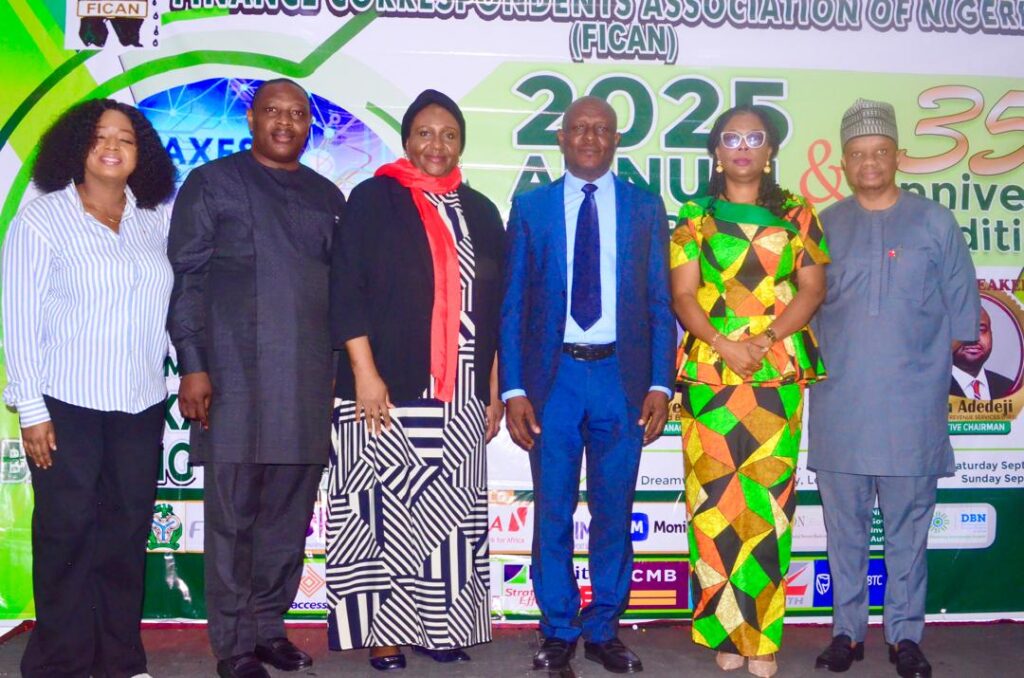Digital transformation key to Nigeria’s economic future – LBS

Digital transformation key to Nigeria’s economic future – LBS
… E-Commerce Market To Exceed $16bn By 2030
The Lagos Business School (LBS) has emphasised the need for Nigeria to embark on a transformative digital journey that can redefine its economy and significantly improve the quality of life for its citizens.
The School noted that the country’s e-commerce market is expected to exceed $16 billion by 2030, supported by pioneering platforms like Jumia and Konga.
The Dean, Lagos Business School, Professor Olayinka David-West stated this at the 35th annual conference of the Finance Correspondents Association of Nigeria (FICAN) held over the weekend in Lagos under the theme, “Bracing for the Digital Economy in Nigeria: Taxation, Banking and Finance”.
Industry stakeholders, including the Federal Inland Revenue Service (FIRS), Central Bank of Nigeria (CBN), and leading banks converged to share insights and shape Nigeria’s digital economy roadmap.
Representing David-West, Prof. Akintola Owolabi, Department of Cost and Management Accounting at LBS, stated that “the conference theme, ‘Bracing for the Digital Economy in Nigeria: Taxation, Banking and Finance,’ is timely and vital for Nigeria’s sustainable development.”
David-West affirmed that the strategic vision at LBS aligns closely with advancing digital transformation and promoting financial inclusion, aiming to develop the leaders needed to navigate and drive this emerging landscape.
Nigeria’s digital economy is undergoing remarkable growth, energised by a young and dynamic population alongside rapid digital adoption. According to the Nigerian Communications Commission’s 2024 report, internet penetration has reached 43.5 per cent, with over 163 million Nigerians online as of March 2024. The telecommunications sector contributes around 18 to 20 per cent to Nigeria’s GDP, highlighting the vital role of information and communication technology (ICT) as a driving force in the economy.
David-West pointed out that “this digital revolution transcends statistics; it reshapes commerce, services, and livelihoods. Our burgeoning e-commerce market, projected to exceed $16 billion by 2030, is fuelled by trailblazing platforms like Jumia and Konga.
“Innovative logistics startups such as Kwik and GIGL illustrate how digital technologies spawn entirely new value chains, enhancing efficiencies and expanding economic opportunities. Such developments promise exponential employment gains, diversification away from oil dependence, and transformative service delivery across sectors.”
She explained that “the Nigerian financial sector is both a driver and beneficiary of the digital revolution. In 2024, Nigeria’s fintech ecosystem attracted over $2 billion in investments, sustaining its position as the continent’s financial technology powerhouse. This capital influx is propelling groundbreaking innovations that redefine financial transactions and inclusion.”
She also said, leading Nigerian banks, including Access Bank and GTBank, harness cutting-edge technologies like Artificial Intelligence (AI) and Machine Learning (ML) to enhance fraud detection, personalise services, optimise credit scoring, and deploy AI-enhanced customer support.
She noted that “in addressing taxation within the digital economy, there are both challenges and substantial opportunities for revenue generation. Since January 2022, Nigeria has implemented a six per cent Digital Services Tax (DST) on non-resident digital service providers, complementing existing VAT on foreign digital services and capitalising on the expanding digital marketplace.”
She cited an example of this initiative is the electronic money transfer levy, which imposes a N50 fee on recipients of bank transfers of N10,000 and above, serving as a valuable revenue stream in Nigeria’s evolving digital payments landscape.
David-West highlighted how digital payments and mobile money services can serve as a foundation for formalising vast informal sectors, enhancing tax compliance, and integrating businesses into formal financial systems.
Looking ahead, she noted that “the interconnection of digital transformation across banking, finance, and taxation is a powerful catalyst for Nigeria’s economic growth. Seamless digital payment systems facilitate efficient tax collection, broaden financial inclusion, and provide critical data for evidence-based policy-making and enforcement.”
She, however, said, “several challenges remain that require immediate attention, including infrastructure deficits such as unreliable electricity and limited broadband access in rural areas, as well as a shortage of digital skills that restrict economic participation. It is essential for regulators to carefully navigate the balance between fostering innovation and ensuring consumer protection amid rapid technological advancements.”
According to her, encouragingly, the Central Bank of Nigeria’s sandbox framework, which is already operational, offers a controlled setting for innovation within fintech, allowing for regulatory experimentation that supports the growth of Nigeria’s digital financial landscape.
“Nigeria stands on the brink of a digital revolution that has the potential to redefine its economic landscape and significantly uplift the quality of life for its citizens.”
Also, the chairman of the Finance Correspondents Association of Nigeria (FICAN), Mr Chima Titus, said, “This year, our conference theme is both timely and urgent, focusing on the digital economy, taxation, banking, and finance.”
He said that “globally, the digital economy has evolved from being merely a promising frontier to a critical backbone of modern growth. In Nigeria and across Africa, we find ourselves on the brink of a significant transformation driven by data, digital payments, artificial intelligence, and cross-border innovation.”
He noted that “Current statistics underscore our potential: the ICT sector contributed 18.3 per cent to Nigeria’s GDP in the second quarter of 2025, and digital payment transactions exceeded N600 trillion in the first half of the same year, showcasing a 22 per cent year-on-year growth. Mobile money usage has surpassed 73 million, successfully reaching rural communities that were previously excluded.
“To further solidify these advancements, the Central Bank of Nigeria has introduced the Payment System Vision 2020, a comprehensive blueprint for our digital future, incorporating AI, block chain settlements, and cross-border payments enabled by the African Continental Free Trade Area.”
Titus added that no robust digital economy can flourish without an equitable and effective tax Framework.”




